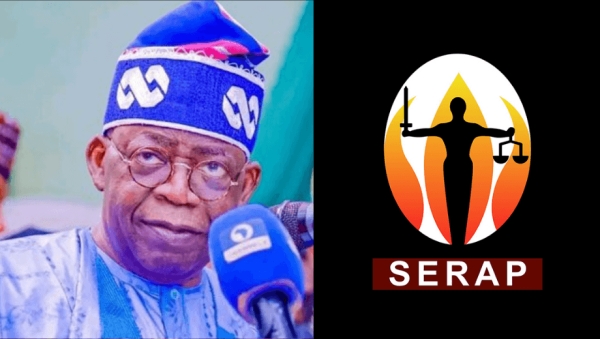The Socio-Economic Rights and Accountability Project (SERAP) has called on President Bola Tinubu to direct a full disclosure of contractors and companies implicated in the disappearance of over N167 billion allocated for projects in 31 federal ministries, departments, and agencies (MDAs).
The funds were reportedly disbursed, but no projects were executed, according to the 2021 audited report by the Office of the Auditor-General of the Federation.
In an open letter dated November 30, 2024, signed by SERAP Deputy Director, Kolawole Oluwadare, the organization demanded that Tinubu instruct the Minister of Finance and Coordinating Minister of the Economy, Wale Edun, and the Accountant-General of the Federation, Oluwatoyin Madein, to publish the names of the contractors and shareholders involved.
SERAP is also urging the government to recover the funds and prosecute those responsible.
The letter highlighted a pattern of corruption documented in the Auditor-General’s report, revealing that contractors absconded with public funds allocated for projects in 31 MDAs.
The Nigerian Bulk Electricity Trading Plc (NBET) alone reportedly paid N100 billion to contractors for projects that remain unexecuted.
Other implicated agencies include the Nigerian Correctional Service, the National Pension Commission, the Hydrocarbon Pollution Remediation Project (HYPREP), and the Petroleum Technology Development Fund (PTDF), among others.
SERAP argued that this massive financial loss has exacerbated Nigeria’s development challenges, depriving citizens of essential services such as education, healthcare, and infrastructure.
“The names of the companies and contractors, along with their shareholders, must be published to ensure accountability and prevent a culture of impunity,” the letter read.
“Publishing these details will deter future corruption and demonstrate the government’s commitment to transparency,” the open letter added.
SERAP also called on the Attorney-General of the Federation, Lateef Fagbemi, SAN, to work with anti-corruption agencies to ensure that those responsible face justice.
The group emphasized that the funds must be recovered and returned to the national treasury for the benefit of citizens.
Failure to act, SERAP warned, would prompt legal action. “If no measures are taken within seven days, we will pursue all appropriate legal actions to compel the government to comply in the public interest,” the organization stated.
SERAP underscored the devastating impact of corruption on Nigeria’s development, noting that the diversion of funds has led to worsening inequality and inadequate public services.
“Corruption undermines economic progress, trapping millions of Nigerians in poverty and depriving them of opportunities,” the letter asserted.
The group also cited Nigeria’s obligations under the United Nations Convention Against Corruption (UNCAC) and the Freedom of Information Act, which mandate transparency and accountability in the use of public funds.
“Your government must show that it will not shield or tolerate wrongdoing by contractors or public officials,” SERAP urged.
The letter concluded by emphasizing that addressing these allegations is not just about financial recovery but restoring public trust in government institutions.


